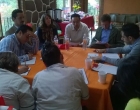Sustainable Agribusiness Supply Chains Workshop | 2014
Archive Emerging Market Multinationals Network for Sustainability

On the 26-27 June 2014 the EMM Network organised the workshop Designing Sustainable Supply Chains in Agribusiness together with Ashoka and Global Compact Mexico in response to the increasing number of large agricultural businesses in Mexico that use their resources, time and efforts to develop inclusive and sustainable supply chains. During the workshop, participants were able to learn about the best practices, tools and methodologies that the pioneers of this development have used.
Description
The EMM Network established a strategic alliance with Ashoka and Global Compact Mexico to develop the ‘Designing Sustainable Supply Chains in Agriculture’ workshop. The main objectives of the workshop were to:
- Identify the general principles to create and manage a sustainable supply chain in the agriculture sector.
- Identify the key processes for a successful development and management of a sustainability-oriented supply chain in the agro sector.
- Take an inclusive business perspective in the creation and management of a supply chain.
Bearing these goals in mind, the workshop provided its participants a space to reflect, discuss and receive practical planning skills. The small-scale format of the workshop ensured its impact, as the participating companies received valuable insights from experts, were presented with best practices and took part in interactive group discussions and tasks with respect to incorporating the concept of sustainability into their agricultural product supply chains. In support of this, Ashoka prepared a working guide for each participant consisting of mostly already existing methodologies that would enable him or her to carry out such activities within his or her business. For activities where existing tools were not known, Ashoka developed them based on their own experience and learning from the project ‘Inclusive Agriculture Agenda‘ (Spanish only).
The workshop was held on the premises of Conservas Santa Rosa, a women’s project which has evolved into one of the principal suppliers of marmalade for the Toks restaurant chain. The case has become an internationally recognized case study.
Report
Main Themes / Events
There are vast opportunities to incorporate the 2 million small-scale producers with less than 5 Ha in Mexico into larger value chains led by the country’s multinational firms. However, although it is in the interest of all stakeholders to establish effective partnerships, many risks and challenges still exist. These challenges are complex and differ according to the specific contexts. Yet, lack of trust and lack of access can be identified as two key challenges in agribusiness, particulary at the nexus between large and small enterprises in agriculture.
The workshop was organized around two main group activities:
Activity 1 – Me and my agricultural supply chain
The first activity introduced the participants to tools for the definition of strategic products and opportunities for their companies to integrate suppliers with a sustainable/social background. This first exercise was essential, as the project design phase commonly does not focus on strategic implications. Therefore, the proposals of many CSR initiatives lack robustness, relevance or risk analysis regarding the other parts of an organization.
Activity 2 – Planning my sustainable supply chain
The second part of the workshop was devoted to the analysis of the first stage of project design in which different partnerships and linkages are deemed necessary to conduct an inclusive agriculture project from the area of CSR/Foundation. The participants of the workshop explored:
Internal partnerships and linkages that are necessary to ensure success of the project in time, the proper involvement of different departments of the company as well as the necessary adjustments to create an inclusive model, taking into account that the company should see itself as a process of innovation.
External partnerships and linkages that are necessary to complement and acquire skills and knowledge, to create a link with small-scale farmers which allows them to integrate into the wholesale supply chains an orderly and sustainable manner.
The workshop participants immediately expressed their willingness to continue investigating and understanding how to incorporate sustainability into their supply chains as discussed during the workshop, as well as to implement the tools learned. In this respect, several follow-up activities within the participants’ companies and in collaboration with the EMM Network arose.


